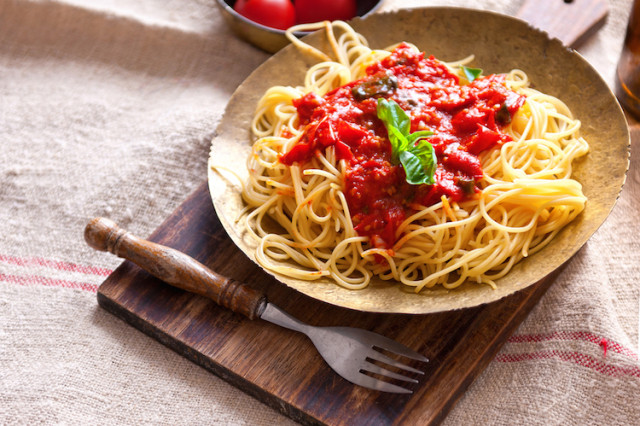
Pasta photo via Shutterstock
By Maria Russo
Day 8 — I am grateful for the chunks in my pasta sauce.
When I was young, my grandmother would strain my pasta sauce because she knew that I wouldn’t eat the small chunks of onion, garlic and tomato that made the dish so thick and flavorful. She never scolded me for the ridiculous request, she was just happy to see me eating the meal she had so lovingly prepared – an act of generosity my family and I took for granted.
My grandmother loved to cook and eat. She only cooked Italian fare — the origin of her recipes no doubt stemmed from the cuisine of her homeland, a little Sicilian seaside town known as Lipari, which suffered a horrible and gruesome past up until the 19th century. I didn’t know it then, but much of what she cooked were peasant meals made completely from scratch; dishes filled with beans the color of earth; inexpensive vegetables like string beans, carrots, onion, garlic and escarole; meat occasionally; and pasta twisted into squiggles, little, short tunnels, long, flat noodles and thin strings that resembled long, wavy hair when slowly folded into a pot of boiling water. The rich aromas of bubbling marinara sauce and hot olive oil always lingered in our house, a smell I still savor today whenever I walk into a family member’s home on a Sunday.
If you would have asked my grandmother if I liked food back when I was a child she probably would have told you that I was finicky and only enjoyed a slice of American cheese on a potato roll (a snack I insisted on eating every day after school). And she was right. My diet was limited to pizza, pasta, turkey sandwiches and devil dogs. Sadly, I never really enjoyed my grandmother’s hearty, healthful meals because I was too afraid of the “chunks” I might encounter in any given dish.
It wasn’t until my mid-twenties that I became aware of how much I loved real food. Like food that didn’t contain ingredients that had their own science lab for production. This love affair with real food started on my honeymoon, where I enjoyed a salad that came from an organic garden only a few feet away from where we were dining. I can remember thinking how incredibly fruity and supple the tomatoes tasted and how crisp and alive the greens were as water spewed from the crunchy leaves with each bite. Before then it never actually occurred to me that food should be alive and brimming with nutrients.
After that ambrosial experience I slowly became obsessed with good, nutritious food: local farms became one of our favorite places to visit on weekends; travel was centered around exploring coffee farms, spice plantations and local markets; and if it didn’t have an “organic” label it wasn’t for us. I enjoyed simple dishes filled with “chunks” of vegetables each representing a color of the rainbow. I began sprouting grains and beans and even dabbled in making fermented foods. There was something so rewarding and interesting about doing things the way people did for centuries before the onset of modernization.
I developed a deep appreciation for Slow Food because I understand the effort it takes to produce a meal as simple as sprouted beans, kale and mushrooms. Organic farming is an intricate process that is labor intensive and requires a full understanding of symbiotic relationships. I imagine my grandmother also understood the importance of a simple meal. As an immigrant to this country, her family was poor and probably survived on whatever they could afford. I often feel her spirit in me while I am cooking, a sign that all those years of straining my sauce did not go unnoticed nor unappreciated.
Each day, I wake up and enjoy an egg, tea and a cupful of granola with raw milk. I snack on buckwheat muffins, fair trade dark chocolate, Japanese sweet potatoes smothered in ghee and avocado mousse. Lunch and dinner always vary based on what the market has in, but there is always variety and there is always abundance. I don’t consider American cheese a food anymore and potato rolls are for the rare occasions when I am at a barbeque and succumb to its pillowy body as a holder for my burger.
As a founder of The Culture-ist, I often receive reports from organizations that study the future of food. Based on scientific predictions and data from organizations such as Food Tank, things are not looking good. Climate change is wreaking havoc on crops and causing massive droughts such as the one that has parched vast swaths of land in California – one of the major suppliers of food in the US. There is no question that food will become a scarce resource for many within the next 50 years.
I never had to sacrifice the way my grandmother did and the way her parents and the generations before them did. I always had enough food, even if it wasn’t the most nutritious stuff, healthful food was always available to me. Perhaps that’s why my grandmother allowed me to indulge in frivolous snacks and discarded the “chunks” from my pasta sauce: she wanted me to enjoy food no matter how silly my tastes were. Food to her was life, it was love and it was joy.
So I am grateful that my grandmother helped me understand the importance of a simple nutritious meal and I am grateful that her spirit remains alive in me today. Hopefully some day soon I will have a garden just as she did and grow the same kinds of vegetables that brought so much life, vibrancy and “chunks” to our meals.